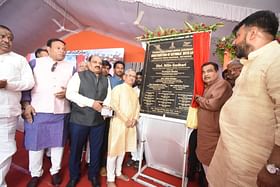In a bid to spur religious travel, Union Minister Nitin Gadkari on Saturday (20 May) laid the foundation stone of a Rs 51.03 crore skywalk facility for devotees of the renowned Renuka Devi Temple in Mahur in Maharashtra’s Nanded district.
Located on the top of a hill, devotees currently have to climb 240 stairs to reach Shri Renuka Mata Temple. The skywalk project, once completed will ease the access to Renuka Mata’s shrine and prove to be a boon for old and disabled people.
Under this project, four capsule lifts will shuttle between the base station located at the bottom of the hill and the station near Renuka Mata’s shrine on top of the hill. Each lift will have a carrying capacity of 20 people, thereby carrying 80 at a time.
Apart from the lift, a skywalk bridge will also be constructed in this project, which will have a travelator on both sides and a total of 22 shops in the middle.
The skywalk with a length of 70 metres and a width of 15 metres will enable smooth movement of incoming and outgoing pilgrims.
The skywalk will be equipped with a public address system and also ensure public safety with CCTV cameras installed, and a connection to the police control room.
Additionally, it will provide bins and restroom facilities. The entire bridge will be lit up to facilitate the public.
Devotees will be able to reach the temple premises directly through lift and sky walk bridge. The project will cost Rs 51.03 crore and will be completed in 18 months.
Shakti Peetha
Mahur is the abode of the goddess Renuka, mother of Parshuram, an incarnation of Lord Vishnu.
There are three mountains in Mahur. The first one and most known is having Renuka Mata Temple. The other two are called Datta Shikhar and Atri Anasuya Shikar temples.
Mahur has a sacred temple to Renuka Mata, which is considered one of the three and half Shakti Peethas (temples) in the state. A big fair is held here every year on the occasion of Vijayadashami.
The move to create infrastructure around religious places is part of the government’s effort to reach out to people across the country and get more religious tourists.


